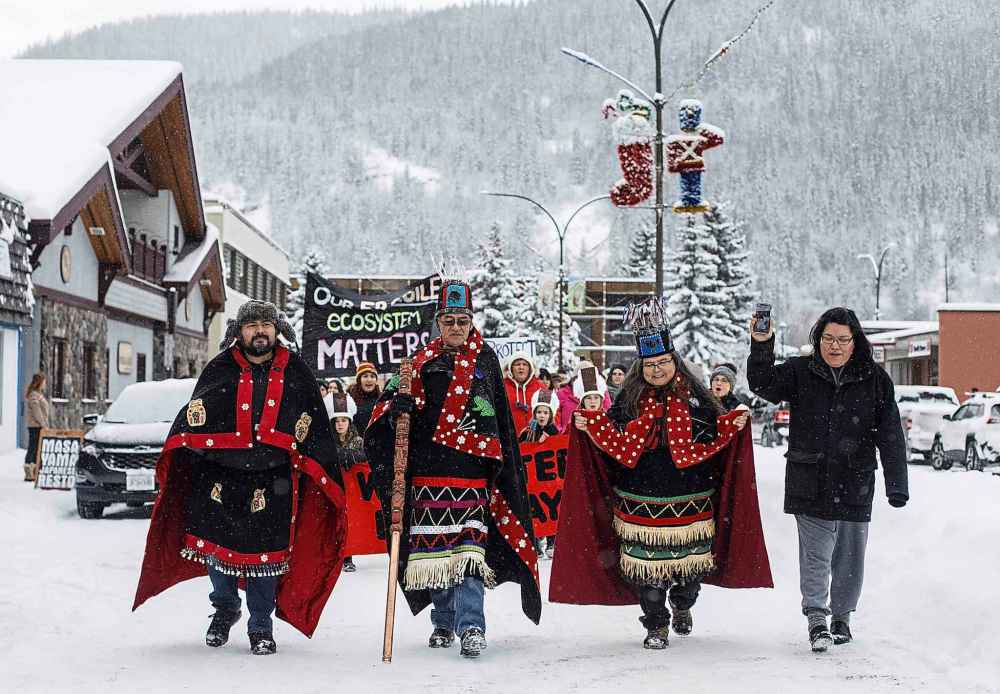B.C. government fails to put Indigenous rights first
Advertisement
Read this article for free:
or
Already have an account? Log in here »
To continue reading, please subscribe:
Monthly Digital Subscription
$0 for the first 4 weeks*
- Enjoy unlimited reading on winnipegfreepress.com
- Read the E-Edition, our digital replica newspaper
- Access News Break, our award-winning app
- Play interactive puzzles
*No charge for 4 weeks then price increases to the regular rate of $19.00 plus GST every four weeks. Offer available to new and qualified returning subscribers only. Cancel any time.
Monthly Digital Subscription
$4.75/week*
- Enjoy unlimited reading on winnipegfreepress.com
- Read the E-Edition, our digital replica newspaper
- Access News Break, our award-winning app
- Play interactive puzzles
*Billed as $19 plus GST every four weeks. Cancel any time.
To continue reading, please subscribe:
Add Free Press access to your Brandon Sun subscription for only an additional
$1 for the first 4 weeks*
*Your next subscription payment will increase by $1.00 and you will be charged $16.99 plus GST for four weeks. After four weeks, your payment will increase to $23.99 plus GST every four weeks.
Read unlimited articles for free today:
or
Already have an account? Log in here »
Hey there, time traveller!
This article was published 08/02/2020 (2134 days ago), so information in it may no longer be current.
British Columbia was the first province to pass the United Nations Declaration on the Rights of Indigenous Peoples, promising to ensure Indigenous nations were included in all decisions that affect their rights.
The November 2019 vote in the legislature was unanimous and seen as a big step for reconciliation.
This week, the B.C. government proved it meant nothing.

On Thursday, RCMP invaded a camp of Wet’suwet’en “land defenders” and arrested six citizens. They were enforcing a court injunction to force construction of a natural gas pipeline.
Residing in several camps on traditional territories on the planned $6-billion, 670-kilometre Coastal GasLink pipeline, Wet’suwet’en citizens oppose the project, saying it threatens their land and livelihoods.
Alongside Wet’suwet’en traditional hereditary leaders, the land defenders assert their nation has never signed a treaty, ceded their title and territories, and neither the federal nor provincial government has authority to take their land.
Those governments., in the meantime, have approved the project, which would transport natural gas from northeastern B.C. to an export terminal at Kitimat.
Government officials have reached “benefit agreements” with 20 band councils along the project’s route, promising payment via money and jobs. For the most part, this is “pay-off” money to governments historically imposed and recognized by the Indian Act — not the traditional hereditary governing system of the Wet’suwet’en.
The Supreme Court, meanwhile, is on the side of the Wet’suwet’en.
In the 1997 Delgamuukw decision, the court determined Aboriginal land rights exist (called “title”) and has never been extinguished by Canada. While treaty areas such as those found on the Prairies are “shared” under treaty, there are almost no treaties in B.C. This means virtually all lands in B.C. are unceded, reside under Aboriginal title, and are governed by Indigenous nations.
The Delgamuukw case recognized the traditional governance of hereditary chiefs (who filed the case and were recognized by the court), not Indian Act leadership. Under Sec. 35 of the Constitution, Indigenous rights are protected and Canada must obtain “free, prior, and informed consent” from Indigenous nations on actions, projects, and initiatives which impact them.
In other words, the Wet’suwet’en are completely legitimate in their claims to stop the construction of the pipeline on their territories. The Wet’suwet’en are self-governing, autonomous, and sovereign people — recognized under Canada’s laws.
Yet, the RCMP removed them anyway.
Now, the B.C. government and NDP Premier John Horgan — who has promised the “rule of law” will prevail, and the Coastal GasLink project will get done — is left with nothing but hypocrisy. His orders to RCMP illustrate he is not interested in implementing the UN declaration beyond pretty words.
The federal Liberals, meanwhile, have remained silent as the RCMP moved in, stating the conflict is a “provincial issue.” This is a cop-out, of course, as any issue involving Indigenous title is governed by federal law.
Prime Minister Justin Trudeau and the Liberals, however, may be running scared.
This week, the Federal Court of Appeal denied the appeal of four B.C. First Nations that oppose the Trans Mountain oil pipeline extension. They had claimed the consultation process was flawed.
For a federal government trying to push through a pipeline of its own and promise “reconciliation” with Indigenous peoples at the same time, the situation between the Wet’suwet’en and B.C. is a preview of what it is going to face.
The conflict is also backdropped by strife within the federal NDP.
MPs such as Leah Gazan of Winnipeg have decried the actions of the RCMP, while NDP Leader Jagmeet Singh refuses to take a clear stand.
Singh has repeated he wants a “continuous dialogue between First Nations and B.C.” — whatever that means. Singh and the federal NDP have close ties to the provincial party — reminding Indigenous peoples that when it comes to the Canadian economy, they will lose every time.
This week was a huge step back for reconciliation.
If provincial and federal governments and the RCMP don’t care about the laws they operate under, one wonders if Canadians or Indigenous peoples should either.
niigaan.sinclair@freepress.mb.ca

Niigaan Sinclair is Anishinaabe and is a columnist at the Winnipeg Free Press.
Our newsroom depends on a growing audience of readers to power our journalism. If you are not a paid reader, please consider becoming a subscriber.
Our newsroom depends on its audience of readers to power our journalism. Thank you for your support.


